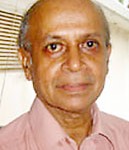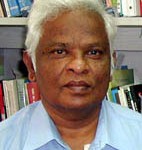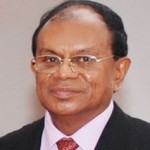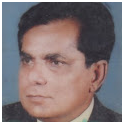–

Prof. Carlo Fonseka
Lately my friend RMB Senanayake has been severely critical of the present government for what he calls “unethical behaviour.” He judges that the government is “following only the Machiavellian ethics of politics which boil down to no ethics at all” (The Island 5 July). As a member of a party (LSSP) which is a constituent part of the government, I feel impelled to examine the validity of his judgment. I may be asked why? The answer is that RMBS is an honorable man whose opinions I respect. If his charge that the present government conducts itself with “no ethics at all” is true, then as a senior citizen first and a party political animal afterwards, I ought to do what I can to replace it with a better one. It is to help me to think through this grave problem that I go to the trouble of responding to RMBS publicly. The Editor of The Island merits high praise for promoting free and open discussion on such matters. Public discussions like this must be the sort of activity which Amartya Sen, the Indian philosopher and Nobel Laureate in economics, calls “democracy as public reason”. He regards “public reasoning” as an essential ingredient of participatory democracy.
Machiavellian Ethics
The very fact that RMBS has invoked the political ethics of Niccolo Machiavelli (1469-1527) to characterize the nature of the present government implies that there have been other governments in history which governed with “no ethics at all”. Machiavelli based his ethics of politics mainly on his observations of the actual political behavior of successful rulers of his time such as Ceasar Borgia in Roman Catholic Italy. In Machiavelli’s view ensuring the territorial integrity of Italy which was divided into many warring principalities, had to be the prime objective of rulers. It was to achieve this objective that he formulated his ethics of politics. When reading about the context in which his ethics came to be worked out, the thought occurred to me that in their view of the best interests of their states, all successful rulers of states whose territorial integrity was threatened, must have been compelled by circumstances at least occasionally to behave unethically. From this speculation, it was only a small step to the hypothesis that because all rulers aspire to be successful, they will if necessary tend to behave more or less unethically. At this point a sweeping generalization became irresistible: “All rulers tend to be unethical but some tend to be more unethical than others.”(Readers familiar with George Orwell’s novel Animal Farm (1945) will remember his famous aphorism: “All animals are equal but some animals are more equal than others”.
Biological Philosophy
Biology being the only subject I have studied in some depth, I tried to figure out in biological terms why rulers of nations if necessary tend to behave unethically, in the best interests of their states. A plausible evolutionary explanation suggested itself. A nation is simply an expanded tribe (or super-tribe) engaged in the struggle for existence in the natural world. The imperative objective of a nation is survival by any means, at all costs. Biologically, first comes survival then comes ethics. (Bertolt Brecht’s memorable line “fodder comes first, then comes morality” comes to mind). In order to buttress this biological explanation with an input from political science, I appealed to the most erudite political scientist I know, Dr. Dayan Jayatilleka through the columns of The Island (12 July). If my appeal caught his eye he ignored it perhaps on the (sensible) ground that the political education of an old medical fogey is not one of his priorities. Fortunately, illuminating insights into the problem came from other authorities.
Friday Forum
Voicing the opinion of the formidable Friday Forum, Sri Lanka’s most distinguished diplomat Jayantha Dhanapala spoke learnedly about the importance of “a balanced and principled foreign policy” for our country. He asserted that in the “globalized multi-polar world we now live in, we have to interact pragmatically with other states”. Pragmatism is popularly understood as the theory of dealing with problems in a practical way without resorting to abstract principles. In my mind, however, pragmatism is associated with the great American medic, psychologist and philosopher William James and his definition of “truth”. In his History of Western Philosophy, Bertrand Russell quotes pragmatist William James as follows: “…an idea is “true” so long as to believe it is profitable to our lives…the true is only the expedient in our thinking…our obligation to seek truth is part of our general obligation to do what pays…”. Russell mercilessly lampoons this definition of truth and ever since then for me pragmatism has been in bad odour. If William James’s definition of pragmatic truth is valid, a pragmatic foreign policy will boil down to doing “what pays”. It can be argued that such a pragmatic foreign policy is precisely what the present government has been carrying out according to its best lights. And no doubt all other governments too, must be pragmatic in their foreign policies. Predictably conflicts of interest are inevitable, producing the international mess the world is in.
Pragmatism in Practice
In a critique of Jayantha Dhanapala’s piece, K. Godage, perhaps our most experienced career diplomat, says that after the defeat of the LTTE in 2009, the Tamil diaspora succeeded in obtaining the support of the US, Britain and France to continue their pitch for Eelam. He then poses this question which helps to expose the real nature of a “pragmatic” foreign policy: “Would they (Britain and US) have supported the LTTE to destabilize this country had Britain continued to own plantations in this country or would the US have moved against Sri Lanka had Motorola, Harris and three other computer chip manufacturers setup their factories here?” In the considered evidence-based judgment of our most senior and respected diplomat, “those two countries would have stood by this country if they had such interests here”. (Sunday Island 25 August). That’s pragmatism for you, the obligation to do “what pays”! First comes capital, then comes ethics! Thus, my dear RMBS, it is not ethics but the antithesis of it, namely, naked economic self-interest that governs the relations between nations. And it can be cogently argued that in reason times Sri Lanka has been acting pragmatically i.e. doing what pays. By so doing Sri Lanka has succeeded in decisively defeating militarily the LTTE, the most blood-thirsty, murderous terrorist organization in recent world history. Though defeated militarily, the LTTE-inspired Eelam project continues unabated and the threat to the territorial integrity of Sri Lanka remains a real one. On the 24th of July this year I had the occasion to sit next to President Mahinda Rajapaksa at the same (marriage registrar’s) table. I took the opportunity to ask him a straight question: “Sir, why don’t you aspire to be a Dammasoka instead of remaining a Chandasoka? His unblinking instant reply was: “How can I try to do that when the TNA has not budged at all from the LTTE – Eelam project?” My only response was to ask in disbelief whether that is really so. The conversation ended abruptly at that point. The Defense Secretary, Gotabhaya Rajapaksa, who just escaped being blown to smithereens during the internecine conflict, is now in the position best equipped to judge the magnitude of the separatist threat. Understandably, the defense establishment is loath to run any risks and reacts – perhaps over-reacts – to perceived threats with no compunction. Equally understandably, RMBS of austere ethical propriety, finds the political behavior of the government
ethically reprehensible and morally repugnant. He asks whether “a state is free to ignore all moral values in the conduct of its business”. The rulers claim that they are in fact conducting state in accordance with their own moral imperatives, especially the need to counter decisively present and future threats to the territorial integrity of the state. RMBS indicts the government of practising Machiavellian ethics of politics forgetting that Niccolo Machiavelli formulated his ethics of politics, specifically with the aim of preserving the integrity of the Italian state of his time. Thus, there is an irreconcilable difference of opinion between RMBS and the rulers of the state duly elected to govern it. In this situation let me put the crucial question that arises in the starkest possible terms: Why should the government conduct its business in the way RMBS prescribes that it ought to? In other words, what is the authority on which RMBS bases his ethics?
Authority in Ethics
This raises a very fundamental question: What is the basis of authority in ethics? It so happens that “Authority in Ethics” is the title of a chapter in Bertrand Russell’s book called Human Society in Ethics and Politics published in 1952 when he was 80. He identifies four (overlapping) sources of authority in ethics: human authority, divine authority, the authority of truth and the authority of conscience. Given the absolutist tone of RMBS’s ethics, it is likely that his ethics derive from a divine source. A secular humanist has no argument to counter such a stance and the matter must end there. But a humanist could point out that if ethics are based on a human authority, then the only sanction known to ethics in a given society, is the assent of the majority in that society. In order to ascertain the thoughts and feelings of the people on a particular matter in a given society it is necessary to ask them, that is to say, to conduct an opinion poll. Conducting an opinion poll is essentially a political process. Thus, in the end ethics leads to politics. That no doubt is why the great Greek philosopher Aristotle regarded ethics as a branch of politics. In practice what the majority in a given society sanctions will constitute the ethics of the society at that point in time. If RMBS’s thoughts and feelings are not in consonance with those of the majority then his opinion (however ennobling it might be) becomes irrelevant. There is no other way to conduct public affairs in a democratic state. RMBS knows Churchill’s celebrated definition of democracy: “It is the worst form of government except all those other forms that have been tried…” On the same analogy the present government may well be the worst one in living memory except for all the others. If RMBS considers matters dispassionately, the thoroughly amoral and unethical behavior of the US – which he seems to regard as the temple of democracy, the guardian of liberty, the dispenser of global justice, the citadel of free enterprise and the God-fearing secular state – in relation to Iraq, Libiya and Siriya, he must surely become less judgmental about the government in his own country. Let us not forget that this country endured a mortal threat to its existence from the worst expression of terrorism the world has seen in recent times. In this context, I will continue to support this government until my friend RMBS comes up with a specific named alternative to replace it. He must recommend it strongly, rationally and cogently instead of preaching transcendental ethics. I insist that he must name his recommended choice because in political matters nothing is easier to do than to indulge in unrelenting criticism of others and do nothing constructive.
Conclusion
A concluding relevant thought may be in order. As member of the LSSP, I stand firmly for the abolition of Sri Lanka’s version of the executive presidency which was criticized to death by Dr. N.M. Perera, the founding leader of the LSSP. I should strongly support every movement to abolish it. Venerable Maduluwawe Sobitha Thero whom I greatly respect knows how much I approve of his powerful campaign to abolish the executive presidency. President Mahinda Rajapaksa is the only one who has the power to do it. If he has the courage and wisdom to do it his name will shine in Sri Lanka’s history like a mighty star.
Courtesy The Island














